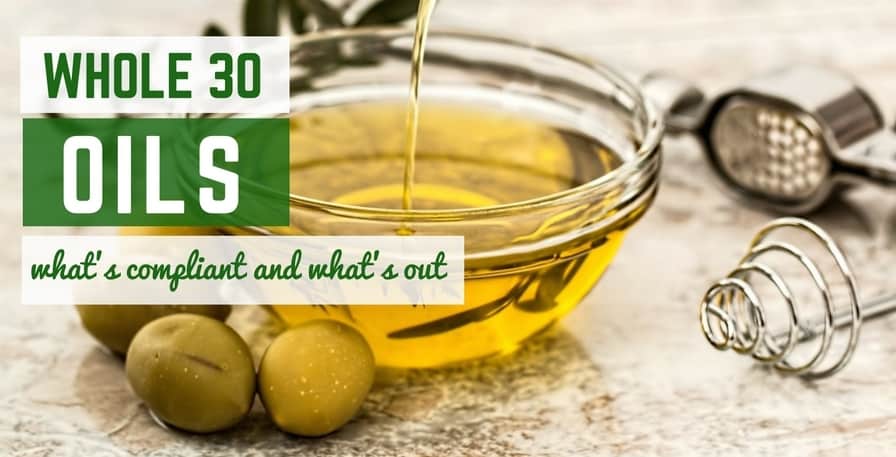Starting your program but wondering what oils are compliant? We’re covering all Whole30 oils in this post to show what’s allowed, what’s out, and what is less than ideal but allowable when you’re Whole30-ing out to eat at a restaurant.
Primary Oils: Essential for Whole30
These are the oils you should be using in the majority of your cooking – we consider them Whole30 essentials for a healthy program.
- Coconut Oil
- Olive Oil / EVOO
Whole30 Permitted Oils
These oils aren’t often used as primary oil sources, but they are totally compliant with the program. Go ahead and grab them if you see them and want to try them, but they aren’t mandatory for your program.
- Avocado oil
- Macadamia nut oil
Limited Use Oils (AKA Restaurants Only)
These oils are permitted because they are commonly used at restaurants, and if you’re going out to eat, they are nearly impossible to avoid.
Still, Whole30-ers are encouraged to avoid these oils whenever possible and not cook with them or use them at home.
- Grapeseed Oil
- Canola Oil
- Safflower Oil
- Sunflower Oil
- Sesame Oil
- Cottonseed oil
Whole30 Rejects: Oils That Are Banned
These oils are not allowed for the duration of the Whole30 program – they’re on the no list.
- Soybean Oil
- Peanut Oil
- Corn Oil
- Rice Bran Oil
Vegetable Oils vs. Healthy Fats
Vegetable oils may sound healthy, with that good ol’ “veggie” wording, but in reality these oils are terrible for us humans.
Why are vegetable oils so bad for us? Vegetable oils contain tons of Omega-6 fats. While Omega-6 fats aren’t inherently evil, humans only need a small amount of them to live, and vegetable oils provide more. Much, much more.
The main issue is that Omega-6 fats aren’t very stable, which means they break down easily with heat, light, or oxygen (and supermarket vegetable oil is often exposed to all three of these).
This results in an oxidation process, making those Omega-6 fats even more problematic, as oxidized fats are highly inflammatory. That, along with the imbalanced relationship to Omega-3 fats that is present in vegetable oil, can result in:
- Arthritis
- Alzheimer’s Disease
- Depression
- Gut Issues
- Plus Other Medical Issues
This video gives another look at why vegetable oils are so gross and should be avoided at all costs (not just in Whole30, but in life).
If you want to learn more about why vegetable oils are unhealthy, and how America culturally moved away from natural fats and lard (which were once commonplace) to processed vegetable oils, make sure to read this great, in-depth piece at Paleo Leap.
Other Healthy, Whole30-Approved Cooking Fats
Other healthy Whole30 cooking fats, outside of oils, include:
- Lard
- Duck fat
- Ghee / Clarified Butter





Is Walnut oil approved?
It’s not ideal and should really only be used in moderation. It is compliant though! It’s just that seed oils have a not fantastic fat profile.
Thanks for this post! I get stuck on, “Oh no, it’s butter!” when I’m using ghee so tend to avoid it. Is ghee is fine to use often, like EVOO, or should it be used sparingly? Thank you!
You’re all good with ghee – go for it and use as much as you want!
Is palmolein oil compliant?
My husband and I are TTC, which is why I decided to do Whole30 – hoping it would help since we are having trouble. However, the Oral Progesterone that my acupuncture gave me has Rice Bran Oil as the first ingredient. Does that mean I absolutely cannot have it? I’m torn….
Rice bran oil is not allowed on Whole30 – sorry!
Drs advice and meds go before whole 30! The sisters have talked about this. past TTC (IF) momma here, hope things went well!